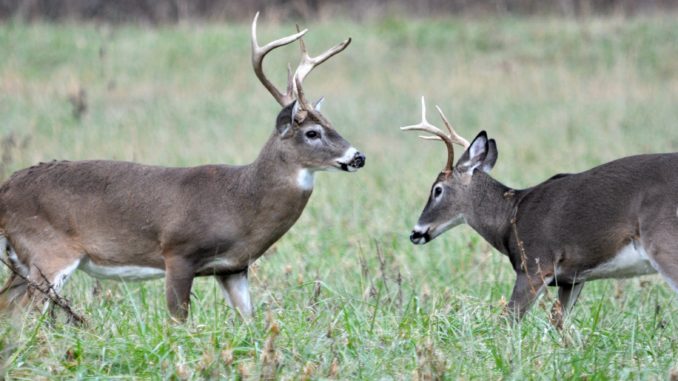
Senate budget bill doesn’t turn deer-farming over the state department of agriculture
A section of the proposed 2014 House budget would transfer management authority over deer farming from the N.C. Wildlife Resources Commission to the N.C. Department of Agriculture and Consumer Services. The Senate budget doesn’t include the proposal and both bodies currently are “reconciling” their versions.
The idea to take captive-cervid authority from the Commission has been pushed for years by the N.C. Deer/Elk Farmers Association, a group founded and led by Tom Smith of Salisbury, former CEO of Food Lion and a long-time rancher of captive deer and elk. Smith and other deer farmers unsuccessfully tried to get the Commission to relax rules regarding deer/elk transfers in 2011 but were unsuccessful.
Smith, who has hired veteran lobbyist John Cooper, contributed $21,500 to political candidates in North Carolina in 2012, according to Board of Election records, including $8,000 to Gov. Pat McCrory, $5,500 to Lt. Gov. Dan Forest, $4,000 to Commissioner of Agriculture Steve Troxler and $2,000 to Rep. Ruth Samuelson of Mecklenburg County, a member of the House Appropriations Committee. All are Republicans.
The Commission, N.C. Camo Coalition and Quality Deer Management Association worry the transfer could harm the state’s wild deer herd and even domestic livestock. The major threat is Chronic Wasting Disease, a fatal disease of the brain and nervous system that kills deer and elk and may transfer to livestock. The disease, spreading from state by state, has cost millions of dollars in containment/eradication in mostly midwestern and western venues and consistently appears in wild deer and elk that live near cervid pens. CWD has reached into Virginia’s deer herd.
Current Commission regulations allow the transport of healthy deer from North Carolina to other states, but importing cervids is prohibited, especially from CWD states, because they could carry the disease.
“It’s a major change and a big risk,” said Dick Hamilton, former executive director of the Commission and current director of the Camo Coalition.
North Carolina, with penned deer managed by the Commission, has never had a case of CWD in its wild or captive deer herd.
“We haven’t had CWD in North Carolina because of the Commission,” said Hamilton, who believes several problems could occur if captive deer/elk management is transferred to the state agriculture department, including a delay in that agency’s adopting rules for permits, fencing, disposition of dead animals, inspections, record keeping and tagging; no finances available in the budget to administer and enforce this responsibility; no trained personnel and no idea how much training would cost; and the budget bill’s effective date (July 1, 2014) would mean no rules for deer at that time and leave the Commission with no statutory rules to govern deer transfers.
The house gave no reason for the change and has not criticized of the present program. There is no study to indicate whether the change would save money, create jobs or make North Carolina’s native deer or domestic animal herd safer; and a recent comprehensive Commission study of the captive deer-farm program to evaluate risks associated with relaxation of importation rules has not been asked for by the legislature.
“The benefit to the state from a meager expansion of a few (37) captive deer farms pales beside the value of our native, wild deer herd,” Hamilton said.
Raising and breeding deer and elk is a multi-million dollar business. Single breed bucks may be worth $100,000, and prime does may cost $20,000. However, even more money may be in play. Over-the-counter dietary supplements claim that powdered deer and elk antlers boost energy, stamina and muscle tone, based on “2,000-year-old Chinese cultural practices.” Individual bottles (4 to 6 ounces) of these supplements sell for $20 to $200, “depending upon potency,” notes one web site.
Six U.S. Congressmen sent a letter June 6, 2014, to Tom Vilsack, secretary of the U.S. Department of Agriculture and top department officials, asking them to ban interstate transport of captive cervids because of the threat it “poses to the health of livestock, native wildlife and even humans.”




Be the first to comment